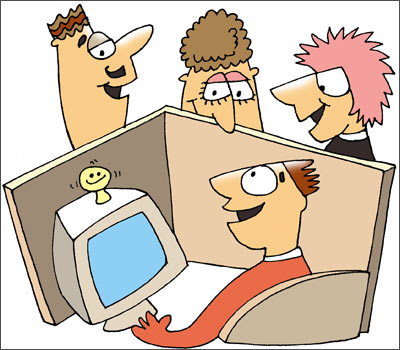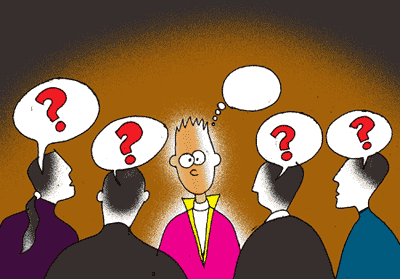How do you make sure that the person you just met remembers you for the right reasons? Language expert Preeti Shirodkar lists out these ten rules!
Etiquettes can be defined as 'unwritten norms of behaviour that make interaction pleasant'. A little bit of care exercised in displaying etiquettes can open up channels for communication and help in creating a better image of the self/the organisation.
Though fairly simple to follow, they are often either ignored or not displayed.
Isn't it often that we approach a 'pleasant' person, rather than a 'grumpy' person, when we desire to get our issues resolved?
Isn't it also that a 'pleasant' interaction adds a smile to our day and influences our behaviour in turn; while an 'unpleasant' interaction can spoil even the best of days/moods.
Since we all face this challenge at some point, with some person and in some situation or another, it is important to be aware of and adopt a few etiquettes in our interactions with others, whether in a formal or in an informal situation.
Illustration: Uttam Ghosh
A pleasant bearing
Image: Everyone likes to interact with a pleasant personThe manner in which a person carries himself/herself and the expressions s/he displays can go a long way in enhancing communication.
The first impression that a person gets of another is what s/he sees and though it is not necessary to be a 'model', being properly dressed, neat and clean creates a pleasant impression.
Moreover, the way a person is sitting or standing while interacting with another can also communicate a great deal about the value the person attaches to the other person/communication.
Finally, a pleasant smile (if the matter is not serious), intermittent nodding of the head and displaying appropriate expressions and reactions pave the way for effective communication.
Illustration: Uttam Ghosh
Greeting a person
Image: Don't pretend to ignore your colleague's presenceThe first time in the day one meets another person, it is important to greet him/her by wishing him/her 'Good Day' in a cheerful tone.
This creates a pleasant feeling. However care should be taken that the greeting does not sound forced, dull or bored, as it then completely loses its impact.
So too, however many times one crosses that person in the course of the day, it is necessary to acknowledge his/her presence through a nod accompanied by a smile.
Illustration: Uttam Ghosh
Offering a seat
Image: You never know how long an interaction will last. Make sure you offer a seatOne does not know how long the interaction between the people interacting will last. It is thus necessary to offer the person a seat, after greeting the person.
This also reduces the awkwardness of the person sitting having to look up at the person and developing a crick in the neck or the person standing having to constantly look down.
Illustration: Uttam Ghosh
Offering water
Image: Offering someone a glass of water is the least you can do.If one has a visitor (a person who does not belong to the same office), it is important to offer him/her water, since that help make him/her comfortable and can put him/her at ease.
Listening carefully without interruption
Image: Give the guy a break, listen to him entirely before counteringOne of the greatest obstructions in effective communication is that most receivers look upon listening as a time when they are waiting to put their views forward, rather than listening attentively.
This not merely disturbs the speaker and breaks the thought process but also hampers gathering the complete message by focussing on it.
Illustration: Uttam Ghosh
Paying undivided attention
Image: Multitasking is fine. But not all the time. Definitely not when you're having a conversationOne should avoid multitasking or exchanging reactions with others while a person is communicating, as it can prove very discouraging or distracting.
Addressing the issue completely
Image: While addressing an issue, keep the other person in the loop at all times so they're not cluelessIf a person comes to another with a difficulty/problem/an issue, it is important to work on it, even if it requires follow-ups till it is resolved.
Moreover, at every stage, it is important to provide a feedback, in order to keep the other person(s) in the loop and prevent anxiety, miscommunication or duplication of efforts.
Illustration: Uttam Ghosh
Offering explanations for inadequacy
Image: Rather than shooting off your mouth explain why you cannot do something, reasonablyRather than saying a blanket 'no', providing an explanation about one's action can help the other person appreciate one's constraints or understand one's point of view.
However, it is important at all times to keep in mind the difference between reasons and excuses, while offering an explanation; as excuses can further aggravate a person facing refusal.
Illustration: Uttam Ghosh
Resolving all questions/doubts
Image: Make sure you have resolved all the doubts the person might haveInstead of focussing on winding up the communication/interaction/issue, it is important to give it adequate time, so that any doubts that the listener/reader may have are resolved to his/her satisfaction.
This prevents miscommunication, repetitive communication or failed communication.
Illustration: Dominic Xavier
Pleasant parting
Image: Make sure you part cordiallyTo make a lasting impression on a person, it is important to part cordially. Courtesy phrases, like 'Have a great day', 'hope this resolves your issue', 'take care', 'sorry', 'thanks' etc can leave the other person with a good feeling.
There is no doubt that '(Even) To disagree, one doesn't have to be disagreeable' - Barry M. Goldwater and Jack Casserly, Goldwater
Illustration: Uttam Ghosh












Comment
article